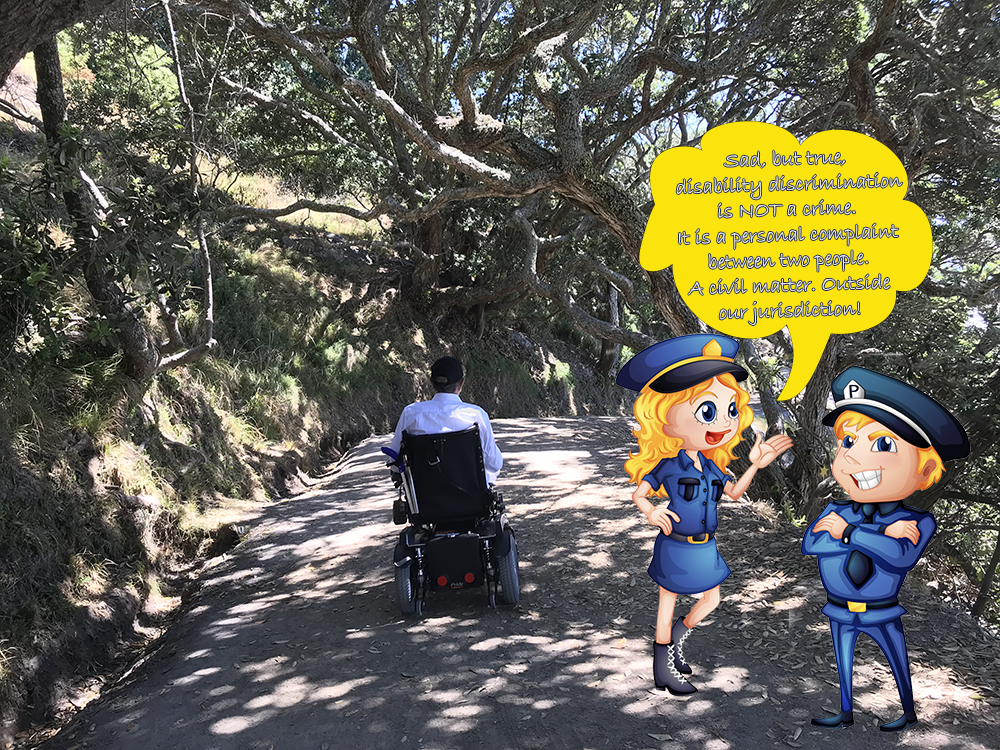Disability Discrimination is NOT a Crime!
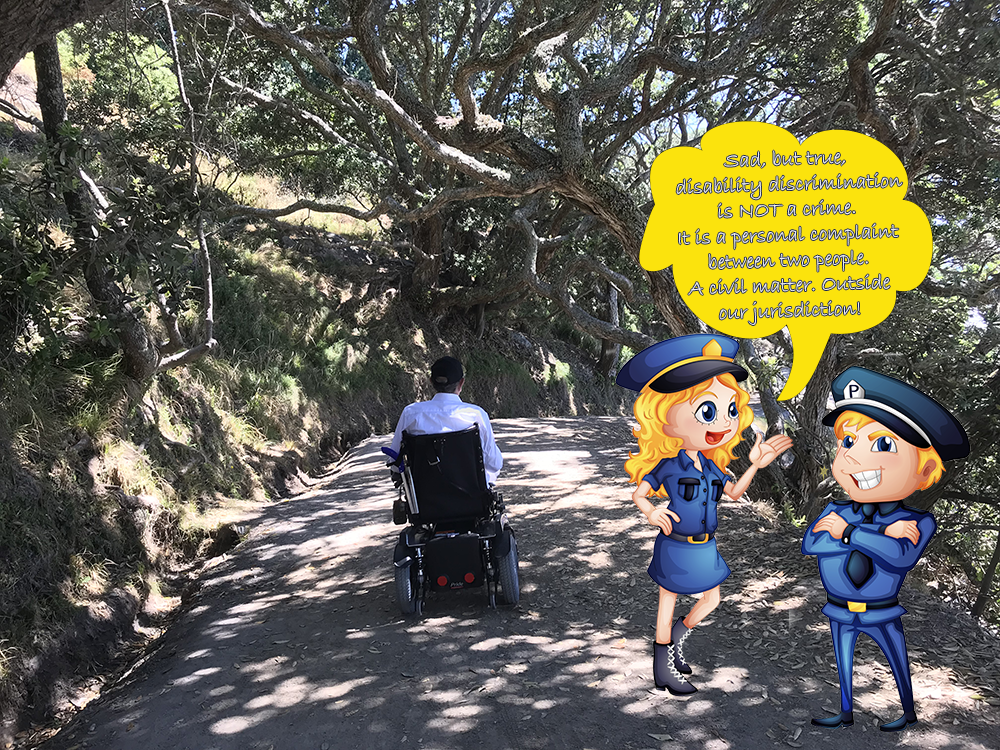
People living with disability are more likely to be involved with the criminal justice system because unacceptable things that happen to them are not recognised or considered as a crime, which can make them hit out due to frustration and feelings of hopelessness.
A Royal Commission in Australia is a public inquiry of the highest legal order on matters of great public importance.
An independent of government legal investigation with broad powers to hold public hearings, call witnesses under oath and compel evidence.
The Royal Commission’s Terms of Reference tell the citizens and the investigators what they should look at and what they should not look at as part of their inquiry.
This author read the following paragraphs of the Royal Commission into Violence, Abuse, Neglect and Exploitation’s Criminal Justice System issues paper and felt intense flight and fight emotional reactions to the meaning behind the words.
“Page 1 and 2… First Nations people with disability face particular disadvantages in the criminal justice system. Research indicates they often experience multiple discrimination due to the intersection of racism and ableism. First Nations people with disability are substantially overrepresented across the criminal justice system. There is a lack of precise information as to the number of First Nations people with disability in prisons. The available information suggests that First Nations people with disability are about 14 times more likely to be imprisoned than the general population.
The Royal Commission wants to hear from you about why people with disability, and particularly First Nations people with disability, come into contact with the criminal justice system at disproportionately high rates. We also wish to understand better the problems people with disability face when they are brought into contact with the criminal justice system…
The Royal Commission into Violence, Abuse, Neglect, and Exploitation of people with a disability has stated it wanted to know about the experience of people with disability in the criminal justice system.
Their issues paper stated the criminal justice system deals with criminal offences.
Easy read paper states – “This is called breaking the law.”
The Royal Commission into Violence, Abuse, Neglect, and Exploitation of people with a disability said it was seeking experiences limited to:
- Police and detectives
- Lawyers including Legal Aid
- Courts including judges.
- Victim support groups and services
- Community corrections officers
- Prisons and corrections officers
The above experiences can only occur in institutional settings in which a power and economic imbalance naturally occurs inviting systemic and seemingly unsolvable problems.
The above experiences will relate to a number of people living with disability who may have committed or are a witness to people who break criminal law and not all people who “break the law”.
There was a huge and distinct difference in the language and terminology being used to invite response to their issue paper and the truth about how our legal system works and that it is broken up into three basic justice jurisdictions in the real world. Criminal, Civil, Statute.
It was important that the Royal Commission into Violence, Abuse, Neglect, and Exploitation of people with a disability looked at the focus on which this topic was being discussed and questioned the reported observations, which have been repeatedly stated for years, and accepted, and seen as absolute truth.
However, the Royal Commission into Violence, Abuse, Neglect, and Exploitation of people with a disability chose not to question the expert’s accepted status quo.
The confusion comes from no alignment of justice within the Justice System.
The confusion is evidenced by the high percentage and number of complaints being received by the Human Rights Commission for disability discrimination and the deceptive high incarceration stated rates of ‘First Nation People’s’ individuals said to be increasing year in year out.
The Australian Human Rights Commission is judged on the number of settled complaints it can achieve between the accepted cases disputing parties through mediation.
Every single race and discrimination complaint settled outside the justice system – success box ticked!
Every single crime nullified outside the court room – success box ticked!
The underlying problem remains the same. More people become dissatisfied and frustrated and some find their tolerance level simply disappears. Human behaviour being what it is some of the people affected will implode inwardly and some of the people affected will explode outwardly.
Sadly, protected people, within the bounds of Australian Human Rights legislation, believe that they have what they are told they have. Protection against unlawful behaviour.
Yet, the truth is, when they take the only realistic action available to them and make a formal complaint, they are put into a mediation situation and expected to be satisfied with, and accept, a token silencing gag gesture to make what happened to them OK and quiet.
No wrongdoing is charged. No wrongdoing is found. No wrongdoing therefore occurred. Thus, the wrongdoing is encouraged to be repeated with a multitude of people over and over and over and over again!
The human right legal protection is proven to be an illusion as the number of examples in the ‘poor customer service’ and ‘juvenile crime’ textbooks increase.
The Criminal Justice System
How can many come into contact with something that is unavailable to them?
In Australia, shop lifting is a crime. Punishment for this crime may entail a sentence of imprisonment. Yet, a lot of unlawful incidents that are experienced by people living with disability, are not a crime.
How antipathetic of me not to accept that disability injustice is a personal complaint, a single experience, that may or may not be unlawful depending on the detail of a given legislation of the Federal or one of the eight state and territory independent governments.
How inconceivable is it that a lot of what happens to people living with disability is lawful violence, abuse, neglect, and exploitation because it is not a crime to treat “that” category of society in such ways?
“What are you going to do? Report me to the police? Like to see you try!”
Oh, of course, if there is physical violation of some sort which results in physical evidence being able to be obtained, the physical violation may be considered to be a criminal offence and not just a personal complaint.
For a crime to be committed a law must exist calling out the criminal act. The law must specify that the act is not only wrong, not merely a civil disobedience, but the act is a crime against an individual and the society that individual lives in at an exact point in time.
Concentrating on institutional settings is far easier to look at and justify the why of behaviours as the human dignity element of each and every individual is being shoved behind the closed door.
Expert opinion, reports and surveys do not reveal the deep pain of each, and every individual created by consistent and repeated mistreatment ignored and reinforced by laws that protect the wrongdoing of unaccountable wrongdoers’ time, and time, and time again.
The pain felt gathers momentum over time and hides away in a deep dark place. It can be extremely hard to describe that pain. It can be extremely hard to identify the cause of that pain. It can be extremely hard to realise how deep and entrenched that pain can be held in every cell of a person’s body until the individual can take no more and breaks.
When a full glass of red wine breaks it makes a hell of a bigger mess than the same glass when empty.
The world, according to the Ancient Greek’s was spherical. An accepted fact. Then during the Middle Ages or around the 17th century society disputed the ancient Greek fact. The world was considered to be flat. A new accepted fact emerged. After a while new evidence was presented, and the world was again accepted as being round. A society accepted fact.
Today, there is a growing movement of people who promote “the world is flat” and it has been reported that in January 2019 in America, a YouGov poll found that around one-third of Americans aged between 18 and 24 believe that the Earth is flat.
If something is repeated over and over again as a truth, then people start to believe it is a fact. This can come from a movements like ‘The world is flat’ and ‘First Nations Peoples’ or it can occur through personal experience of being treated in a certain way over and over again.
Consider a child at school where a teacher gives the child a consistent message, they are a problem child. Feelings of isolation and helplessness, then hopelessness, develop and the child can then take ownership of the label they have been given and start to act as that predicted.
The problem child may start to act out and cause trouble, as problem children do, and most likely the problem child will end up committing a crime and gain a new label of criminal.
The problem child is then told they are a problem criminal, and the cycle is repeated… the problem children behave as they have been predicted as problem criminals to behave.
Another option for the problem child is for them to remove themselves from the system, or from life itself via suicide.
The academic expert opinions, research, and data are all seemingly proven to be a correct analysis of the collected statistics of people within the criminal justice system.
If one is blind to the truth of actual lived experience one sees one-side of an argument.
There is no absolute truth as one cannot know what has never been.
Yet, in Victoria, a driver who enters an intersection when a camera determines the traffic light was red is 100% guilty of a crime. The act is deemed to be an absolute truth. No argument of innocence is allowable or tolerated. The act is defined as a crime with a financial penalty applied as a just punishment.
Australia does not currently have a death penalty, but it has in its past and may very well have a death penalty as a punishment for a criminal offense in the future.
A crime and it’s just punishment are determined in every society by law makers and law administrators of the day. An action that is made a crime in one state or territory or country may not be a crime across the border.
The punishment for a designated crime is varied for the same designated crime depending on which society a person lives in. A crime can be designated in several different ways so that the crime has the best chance of being prosecuted to record a guilty verdict.
People living with disability are more likely to be involved with the criminal justice system because unacceptable things that happen to them are not recognised or considered as a crime, which can make them hit out due to frustration and feelings of hopelessness.
The police are not interested in disability injustice as the laws relating to it are not covered by their jurisdiction.
Any government of the day is not interested in what happens people living with disability as they have made ‘adequate’ personal complaint laws that the courts are directed to deal with.
The law and the Human Right Court see a disability injustice complaint as a dispute between two people. A ‘he’ said ‘she’ said type scenario. The aim is to settle the personal conflict and not to stop the wrongdoing or unlawful act from occurring again.
The unlawful act is not a crime it is only a personal complaint between individual case parties. Every act of injustice is determined to be a civil matter. A person-to-person dispute of no real society consequence.
Sometimes a law makes discrimination a civil disobedience, most often, the injustice is accepted as invisible or merely an inconvenience, a fact of how life is.
No jurisdiction calls the act of illegal discrimination a crime. No matter how many times the same person is subjected to the same treatment over and over and over again and again and again.
Australia is one society with people from a vast number of different cultural backgrounds living within it.
The Royal Commission into Violence, Abuse, Neglect, and Exploitation of people with a disability divided people with disability into risk categories and race categories and economic categories. Exposing that being a citizen with equal rights under the same laws of the land as all others was a total farce.
Disability injustice is not dependent on the colour of your skin, your race, your gender, your sexual preference, your age, your place of residence, or your economic situation.
The only attributes that identify the injustice are physical (including sensory), mental (including intellectual) impairments – FULL STOP.
Disability injustice can only occur in the daily life of all people living with physical, and mental impairments in a given society.
People living with physical, and mental impairments do directly include more than the person who has the physical or mental impairment.
Fact 1.
Tony, a paraplegic, which is a severe and permanent mobility impairment was treated less favourably to every person with a severe vision impairment.
Why because the law implemented by the Australian Department of Human Services says he must be.
Hardcore disability injustice against many people living with disability in our society is not a crime it is the law.
Fact 2.
Tony, a paraplegic, which is a severe and permanent mobility impairment was denied access to the National Disability Insurance Scheme because of his age.
Why because the law administered by the Australian Government agency says he must be.
Hardcore age injustice against many people in our society with a severe and permanent mobility impairment is not a crime it is the law.
Fact 3.
First Nations People with disability have been a key area of inquiry for the Royal Commission into violence, abuse, neglect, and exploitation, who is treating them differently because of their preferred race identity.
Tony, a paraplegic, which is a severe and permanent mobility impairment, and his wife Maria, are less relevant to the Royal Commission into violence, abuse, neglect, and exploitation, than a paraplegic and their spouse who are or who identify as First Nations Persons.
Blatant racial discrimination being applied by the very body that is an extension of the Australian Attorney General’s Department engaged to investigate Violence, Abuse, Neglect and Exploitation of people with disability.
Undeniable racial injustice against many people is not a crime it is sanctioned by a Royal Commission investigation.
Fact 4.
Tony, a paraplegic, which is a severe and permanent mobility impairment, when appearing at Victorian Civil Administrative Tribunal in Melbourne for disability discrimination civil matter had no independent access to any courtroom he attended.
The buildings had wheelchair access from the street into the building, but the individual courtrooms did not have power assisted opening doors.
Not providing independent access to a courtroom is not a crime it is an inconvenient truth of our justice system.
How is a VCAT member going to determine illegal disability injustice occurred when a private company did not provide independent access to a wheelchair user in public areas of their facility when the government law court is guilty of the exact same unjust act.
Fact 5.
Tony, a paraplegic, which is a severe and permanent mobility impairment, pays the same rate for accommodation at venues as physically abled people do.
Due to his impairment access is not always provided due to physical barriers. The provision of a balcony like this example in a wheelchair accessible room is not a crime, instead, the provision of this balcony fits into the poor customer services textbook!
As one small example of typical experience, I include some photos.
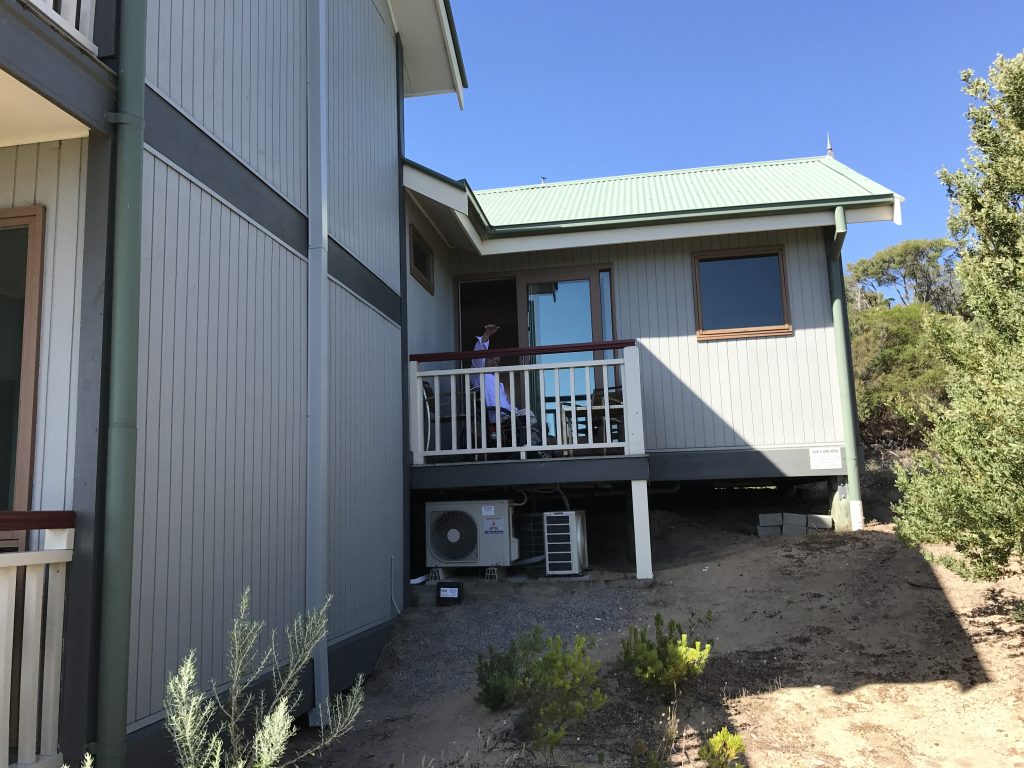
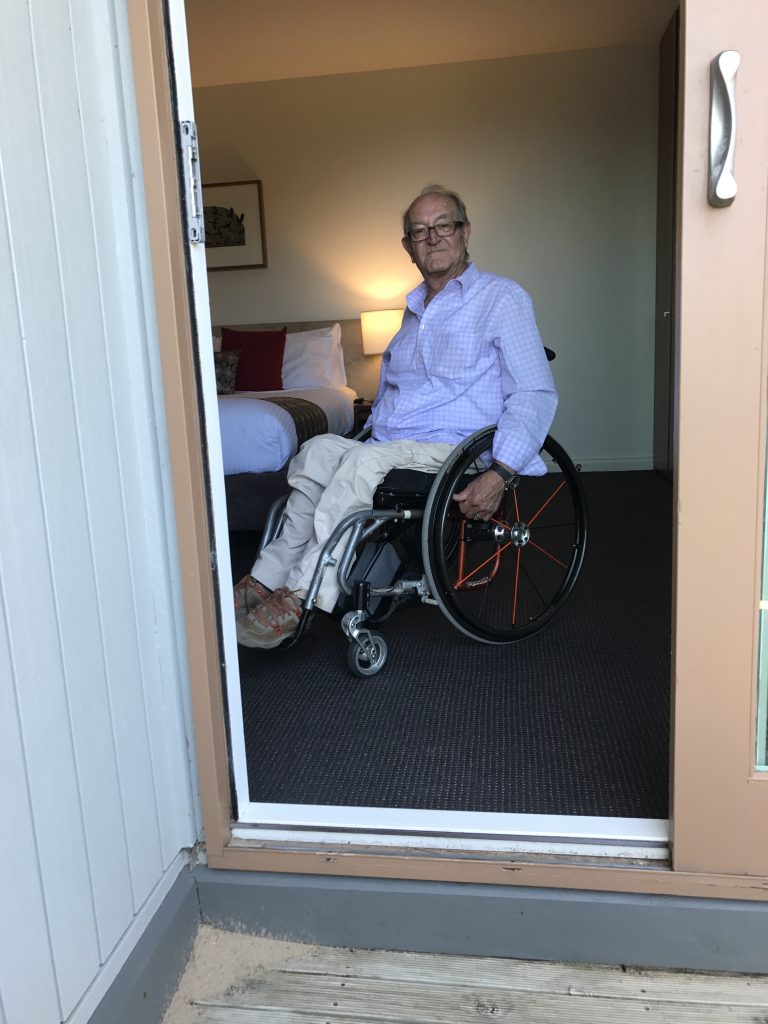
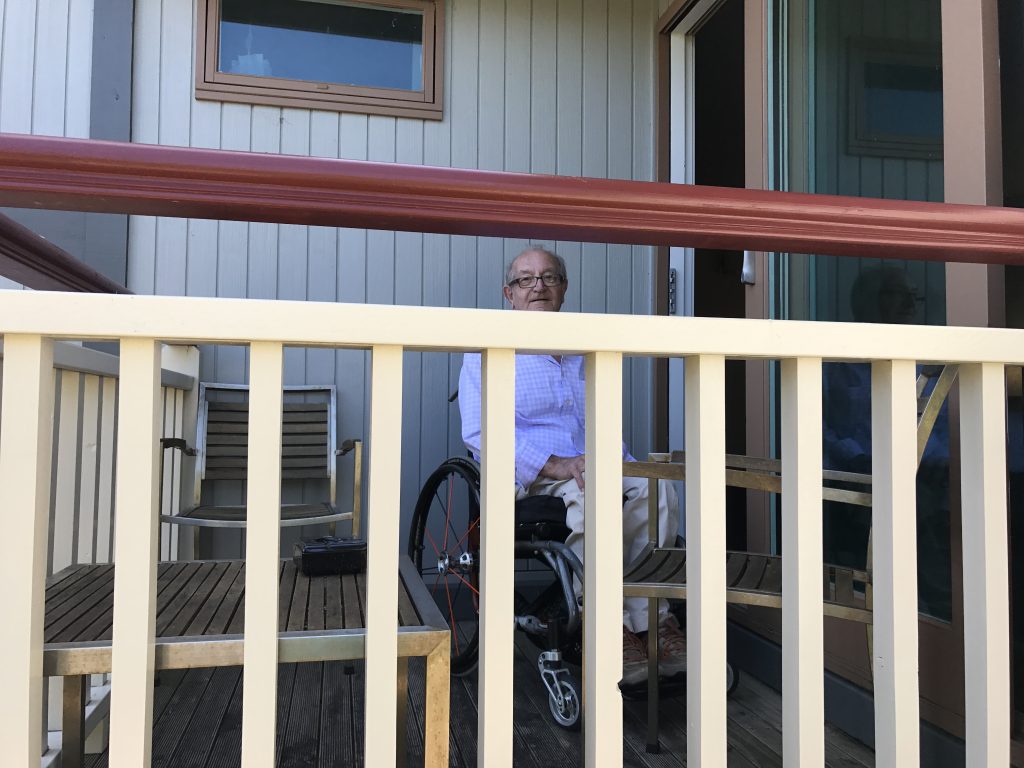
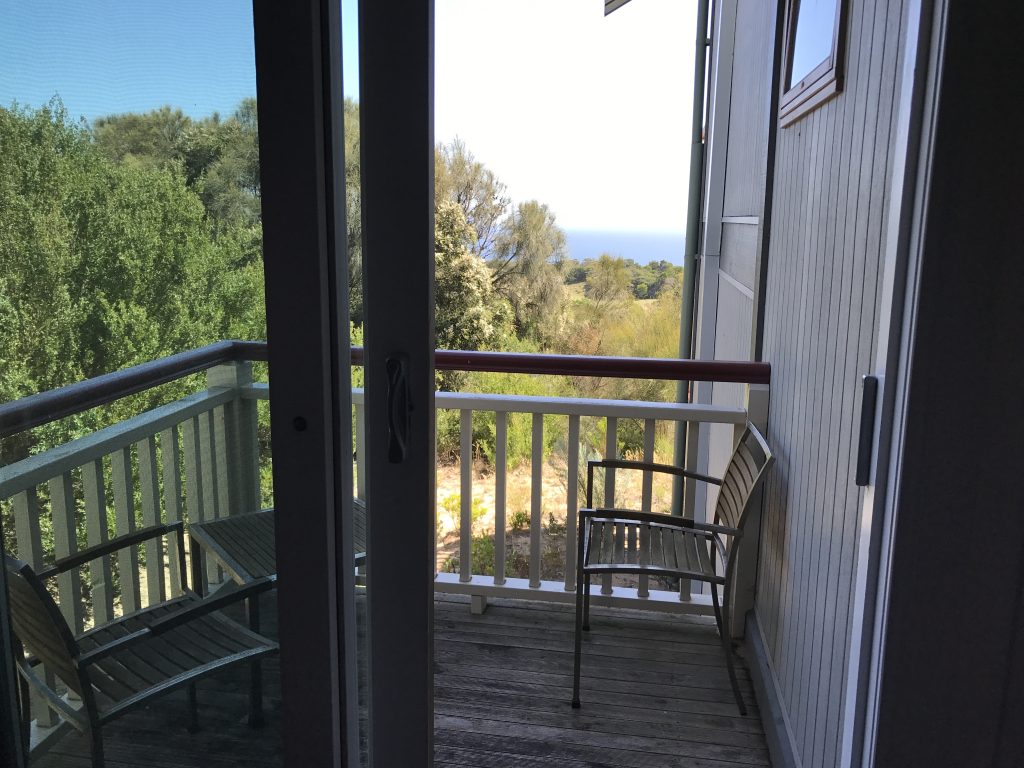
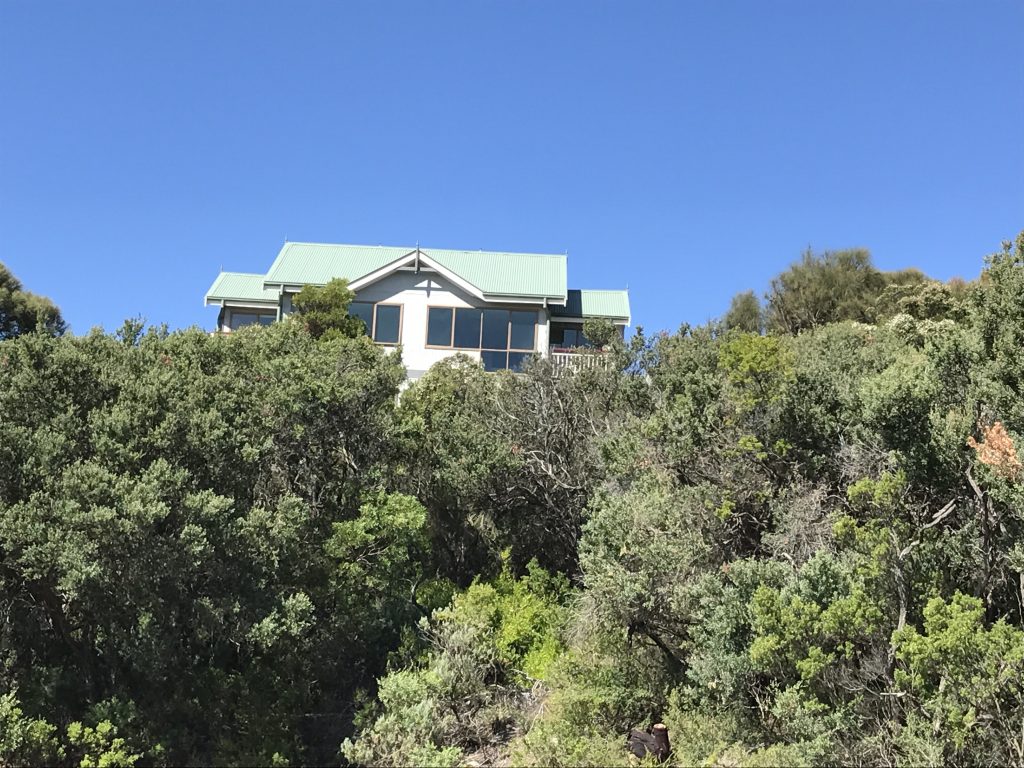
These pictures were taken at the RACV resort in Cape Shank in Victoria in February 2017 after arrival at our pre-booked ocean view balcony room. The one and only wheelchair accessible Ocean-view room at the resort at that time.
Does the reader see the problem, or do I need to explain?
Remember the provision of a balcony like this example in a wheelchair accessible room is not a crime.
In our justice system it is personal dispute between the wheelchair user and the venue provider if a complaint is initiated by the wheelchair user.
How many times does such an action have to occur before it is deemed a crime to treat people living with impairment this way, time and time and time again?
As I sat and thought about authoring a response to the Royal Commission issues paper, I felt an internal conflict; should I make the time to or should I walk away and try and get on with my life. I don’t have to live in that world anymore but I am aware many other silenced people do.
People living with impairment are continually told they have human rights. The right to access to justice for people with disability is front and centre with Article 13 having an aim (with conditions) to ensure “effective access” to justice on an equal basis to others.
The biggest problem is that if a person living with ‘disability’ breaks a criminal law they are punished because they are found guilty of committing a crime. Yet, the law says what people do to you collectively is not answerable in criminal law. Your justice right sits in the personal complaint arena.
People living with disability “are therefore at risk of discrimination and victimisation and, as a consequence, more likely to be charged with offences and enmeshed within the criminal justice system.”
